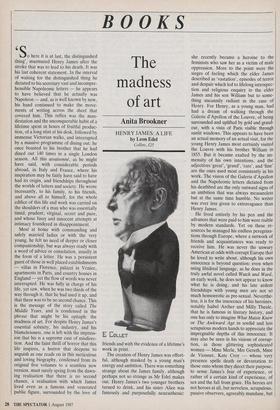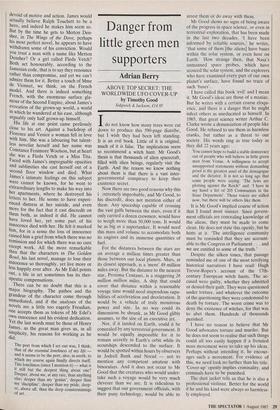BOOKS
So here it is at last, the distinguished thing', murmured Henry James after the stroke that was to lead to his death. It was his last coherent statement. In the interval of waiting for the distinguished thing he dictated to his secretary vast and incompre- hensible Napoleonic letters — he appears to have believed that he actually was Napoleon — and, as is well known by now, his hand continued to make the move- ments of writing across the sheet that covered him. This reflex was the man- ifestation and the unconquerable habit of a lifetime spent in hours of fruitful produc- tion, of a long stint at his desk, followed by immense Victorian walks, and interrupted by a massive programme of dining out: he once boasted to his brother that he had dined out 140 times in a single London season. All this assaisonne, as he might have said, with considerable periods abroad, in Italy and France, where his inspiration may be fairly have said to have had its origin, and friendships throughout the worlds of letters and society. He wrote incessantly, to his family, to his friends, and above all to himself, for the whole edifice of this life and work was carried on the shoulders of a man who was essentially timid, prudent, virginal, secret and pure, and whose fussy and innocent attempts at intimacy foundered in disappointment.
Most at home with commanding and safely married ladies or with the very young, he felt no need of deeper or closer companionship, but was always ready with a word of advice or consolation, usually in the form of a letter. He was a persistent guest of those in well placed establishments — villas in Florence, palazzi in Venice, apartments in Paris, and country houses in England — yet the flow of words was never interrupted. He was fully in charge of his life, yet saw, when he was two thirds of the way through it, that he had used it up, and that there was to be no second chance. This is the message of the story called The Middle Years, and is condensed in the phrase that might be his epitaph: the madness of art. For despite Henry James's essential sobriety, his industry, and his blamelessness, one is left with the impress- ion that his is a supreme case of misdirec- tion. And the faint thrill of horror that this life inspires, a horror that deepens to anguish as one reads on in this meticulous and loving biography, condensed from its original five volumes to a seamless new version, must surely spring from the dawn- ing realisation that there is no second chance, a realisation with which James lived even as a famous and venerated public figure, surrounded by the love of
The madness of art
Anita Brookner
HENRY JAMES: A LIFE by Leon Edel
Collins, £25 friends and with the evidence of a lifetime's work in print.
The creation of Henry James was effort- ful, although masked by a young man's energy and ambition. There was something strange about the James family, although perhaps not so strange as Mr Edel makes out. Henry James's two younger brothers turned to drink, and his sister Alice was famously and purposefully neurasthenic: she recently became a heroine to the feminists who saw her as a victim of male oppression. More to the point were the sieges of feeling which the elder James described as `vastation', episodes of terror and despair which led to lifelong introspec- tion and religious enquiry in the elder James and his son William but to some- thing uncannily radiant in the case of Henry. For Henry, as a young man, had had a dream of walking through the Galerie d'Apollon of the Louvre, of being surrounded and uplifted by gold and grand- eur, with a vista of Paris visible through sunlit windows. This appears to have been an actual memory of an actual visit, for the young Henry James most certainly visited the Louvre with his brother William in 1855. But it became exalted by the im- mensity of his own intentions, and the adjectives 'great', 'grand', 'rare', and 'fine' are the ones used most consistently in his work. The vision of the Galerie d'Apollon and the Napoleonic letters dictated from his deathbed are the only outward signs of an ambition that was always measureless but at the same time humble. No writer was ever less given to extravagance than Henry James.
He lived entirely by his pen and the advances that were paid to him were risible by modern standards. Yet on these re- sources he managed his endless peregrina- tions through Europe, where a network of friends and acquaintances was ready to receive him. He was never the unwary American at odds with corrupt Europe that he loved to write about, although his own innocence is beyond question: even when using libidinal language, as he does in the truly awful novel called Watch and Ward, an early work, he does not appear to know what he is doing, and his late ardent friendships with young men are not so much homoerotic as pre-sexual. Neverthe- less, it is for the innocence of his heroines, notably Isabel Archer and Milly Theale, that he is famous in literary history, and one has only to imagine What Maisie Knew or The Awkward Age in sordid and less scrupulous modern hands to appreciate the impregnable depths of this innocence. It may also be seen in his visions of corrup- tion, in those glittering sophisticated women — Mme Merle, Mrs Gereth, Mme de Vionnet, Kate Croy — whose very presence spells death or devastation to those onto whom they direct their purpose, to sense James's fear of experience, or rather of a certain kind of experience, of sex and the fall from grace. His heroes are not heroes at all, but nerveless, scrupulous, passive observers, agreeably mundane, but devoid of motive and action. James would actually believe Ralph Touchett to be a hero, and indeed he makes him seem so. But by the time he gets to Merton Den- sher, in The Wings of the Dove, perhaps his most perfect novel, he appears to have withdrawn some of his conviction. Would you trust a man with a name like Merton Densher? Or a girl called Fleda Vetch? Both act honourably, according to the Jamesian code, that is to say they renounce rather than compromise, and yet we can't admire them for it. Better a touch of Mme de Vionnet, we think, on the French model. And there is indeed something French, with the enormous surface gla- mour of the Second Empire, about James's evocation of the grown-up world, a world in which he wandered at his ease, although arguably only half grown-up himself. His life at one point came perilously close to his art. Against a backdrop of Florence and Venice a woman fell in love with him. She was a labouring but talent- less novelist herself and her name was Constance Fenimore Woolson, but at heart she was a Fleda Vetch or a Miss Tita. Faced with James's impregnable opacities and sublimities she cast herself out of a second floor window and died. What James's intimate feelings on this subject were cannot be known, for he went to extraordinary lengths to make his way into her apartments, where he destroyed his letters to her. He seems to have experi- enced distress at her suicide, and even more for the fact that it cast discredit on them both, as indeed it did. He cannot have loved her, yet some part of his innocence died with her. He felt it marked him, for in a sense the loss of innocence caused him a grief from which there was no remission and for which there was no cure except work. All the more remarkable then that the characters in The Golden Bowl, his last novel, manage to lose their innocence so thoroughly, yet live more or less happily ever after. As Mr Edel points out, a life in art sometimes has its ther- apeutic compensations. There can be no doubt that this is a major biography. The pathos and the grandeur of the character come through unmediated, and if the analyses of the novels are a little too eagerly Freudian, one accepts them as tokens of Mr Edel's own innocence and his evident dedication. Yet the last words must be those of Henry James, as the great man gives us, in all simplicity, his reasons for working as he did: The port from which I set out was, I think, that of the essential loneliness of my life and it seems to be the port, also, in sooth, to which my course again finally directs itself. This loneliness (since I mention it) — what is it still but the deepest thing about one? Deeper, about me, at any rate, than anything else; deeper than my 'genius', deeper than my 'discipline', deeper than my pride, deep- er, above all, than the deep counterminings of art.



















































 Previous page
Previous page